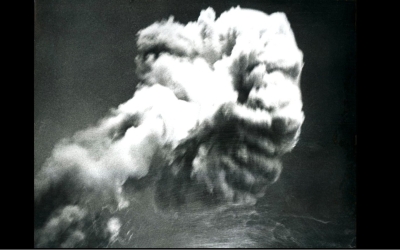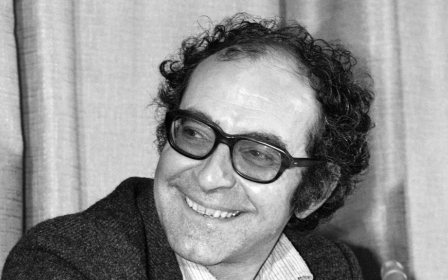Oppenheimer: The glorification of mass murder – coming to a cinema near you

It is impossible to live in North America, or western Europe, I presume, and perhaps other parts of the world still under the cultural suzerainty of these areas, and have missed the “Barbenheimer” phenomenon: the conflation of the titles of two summer blockbuster movies, Barbie and Oppenheimer, released late in July.
But you might be surprised to learn that when I tried to make ticket reservations online to see Oppenheimer in cinemas nearby in New York, venues in midtown Manhattan areas mostly inhabited by rich and middle-class people, they were all sold out.
Yet when I checked our favourite cinema nearby, Magic Johnson in Harlem, frequented by mostly working-class folks, there were tickets aplenty. The biopic about J Robert Oppenheimer, a rich white man who helped the US build the atomic bomb and drop it on innocent people in Japan, seems to be fascinating only to a certain well-heeled demographic in the US.
So, on the opening weekend of the much-hyped event, we sat in a screening at the Magic Johnson complex, at about 20 percent occupancy, and watched Christopher Nolan’s massively marketed movie.
It is an antiquarian piece of historical drama set at the end of World War Two, when Americans were racing against time to beat the Nazis and the Soviet Union to build an atom bomb. Just to make sure that it actually worked and would maim and murder people, and to show the Soviets that it worked, the US dropped two of them on Japan, on the cities of Hiroshima and Nagasaki, incinerating tens of thousands of innocent civilians.
New MEE newsletter: Jerusalem Dispatch
Sign up to get the latest insights and analysis on Israel-Palestine, alongside Turkey Unpacked and other MEE newsletters
After successfully building the bomb, Oppenheimer, who also pinpointed the cities in Japan on which they should be dropped, quoted not from his own holy scripture, say from Zechariah or Isaiah, but for some bizarre reason from Bhagavad Gita: “Now, I am become Death, the destroyer of worlds.”
What did Indians or Bhagavad Gita have to do with anything?
Rich man’s cinema
Nolan’s account seeks in earnest, but ultimately in vain, to give moral and political complexity to “the father of the atomic bomb”.
But despite three hours of state-of-the-art visual and sound effects and some superb acting by Cillian Murphy in the title role, together with an ensemble of world-class supporting actors, the film thoroughly fails to convince that there are any redeeming factors or moral lessons to be drawn from the story of Oppenheimer.
Nolan is a master craftsman and he loves to show off all his cinematic prowess. You walk out of the theatre into the real world convinced you have been at a sumptuous dinner party at the house of a rich and powerful man at the top of his career.
Then comes the acid test of telling your friends and family what the film was about. Nolan’s Oppenheimer is the story of the man who suspended all his moral and political flirting with the liberal left to build an atom bomb to be dropped on a defeated nation, so that the US could sustain its claims to be a predatory global empire.
The power of the film is in its scripted masterstrokes, for bringing the personal, political, moral, scientific and world-altering changes to our awareness of where in the world we stand today.
What we see is how Oppenheimer’s sexual dalliances, and his ideological flirting with progressive ideas, proceed apace as his scientific brilliance (conversant with Einstein and his peers) is morally compromised by his ambitions. He allows himself to be abused in the service of militarism to build the bomb, and then what was left of him - a morally dead carcass - is chewed and spat out by the reactionary political forces led by the chairman of the US Atomic Energy Commission (AEC), Lewis Strauss (played by Robert Downey Jr).
Fully aware of his leftist flirtations, American military and intelligence warlords kept Oppenheimer on a tight leash by accusing him of communist affiliations
Meanwhile, Nolan makes sure we witness Oppenheimer strolling in a museum studying Braque and Picasso, thinking of Marx and Freud in German, reading TS Eliot’s The Waste Land, listening to Stravinsky’s The Rite of Spring, and studying Sanskrit to allow him to read Bhagavad Gita in the original, while having sex with a communist lover - Jean Tatlock (Florence Pugh).
We see Oppenheimer as a lapsed Jew who could master Dutch in a few weeks, well enough to deliver a lecture in physics, and yet he was a born and raised New Yorker who never learned Hebrew.
But the prospect of the Nazis getting hold of an atomic bomb propels him to lead the charge to build one for the US. Fully aware of his leftist flirtations, American military and intelligence warlords kept Oppenheimer on a tight leash by accusing him of communist affiliations. They then used such charges to make him work harder to prove his loyalty. He very much obliged.
Reactionary politics
I am not a fan of Nolan’s cinema. As someone who grew up on a healthy and robust regimen of Iranian, Indian, Japanese and the best of European indie films, Nolan’s oversized and opulent cinema looks like a rich boy showing off his financial prowess and the expensive Lamborghini he just bought.
His politics are exceedingly reactionary, as perhaps best evidenced in his versions of Batman and Dunkirk.
In his Oppenheimer, he has directed his rich resources towards glorifying the man who engineered a weapon of mass murder. He thinks his film is very timely. It is not. It is too late.
From the vantage point of 2023, with literally thousands of those nuclear bombs at the disposal of countries as colossal as the US, Russia and China, as fragile as Pakistan and as violent and aggressive as the settler-colonial state of Israel, there is very little the film can do, if anything, other than stage a piece of antiquarian curiosity in the service of complicating a very simple fact: Oppenheimer built and tested an atom bomb in Los Alamos before he gave two to the US to drop on innocent Japanese people.
The movie is based on the 2005 book American Prometheus: The Triumph and Tragedy of J Robert Oppenheimer, by Kai Bird and Martin J Sherwin. But the power of the film rests less on historical accuracy or its convoluted storytelling than on the monumentality of the technical virtuosity Nolan has mobilised.
Nolan, too, has made an “atomic” movie to celebrate a deeply flawed builder of a weapon of mass destruction - and we are expected to rush to the biggest screen possible to cheer his achievement.
Though British in birth and upbringing, Nolan has definitely produced an American film in the worst sense of the term, overcompensating for the moral depravity of the subject matter by shocking his audience to believe they are watching something truly earth-shattering, just like those bombs in Los Alamos and then in Japan.
Imamura’s masterpiece
While I acknowledge the directorial and technological wizardry behind the film, Nolan’s Oppenheimer had exactly the opposite effect on me to the one he probably had in mind. All I was able to think about as I sat through the film was the gentility and grace of the Japanese pre- and post-war cinema of Yasujiro Ozu, Kenji Mizoguchi, Akira Kurosawa and Shohei Imamura.
What does it say about the world that nearly 80 years after the dropping of the truly apocalyptic bombs on Japan, the US and the UK have given us this epic spectacle glorifying the creator of the most terrorising weapon of mass destruction ever seen, while the victims of that criminal atrocity have given the world the most sublime examples of filmmaking?
When I got home, I watched Imamura’s 1989 masterpiece Black Rain, based on the 1966 novel of the same title by Masuji Ibuse.
I recommend you do the same. It will restore your vulnerable humanity and make you terrified by the consequences of what Oppenheimer did to real human beings, people at the deadly receiving end of his scientific contribution to one of the most vicious war crimes in human history.
The views expressed in this article belong to the author and do not necessarily reflect the editorial policy of Middle East Eye.
This article is available in French on Middle East Eye French edition.
Middle East Eye delivers independent and unrivalled coverage and analysis of the Middle East, North Africa and beyond. To learn more about republishing this content and the associated fees, please fill out this form. More about MEE can be found here.






